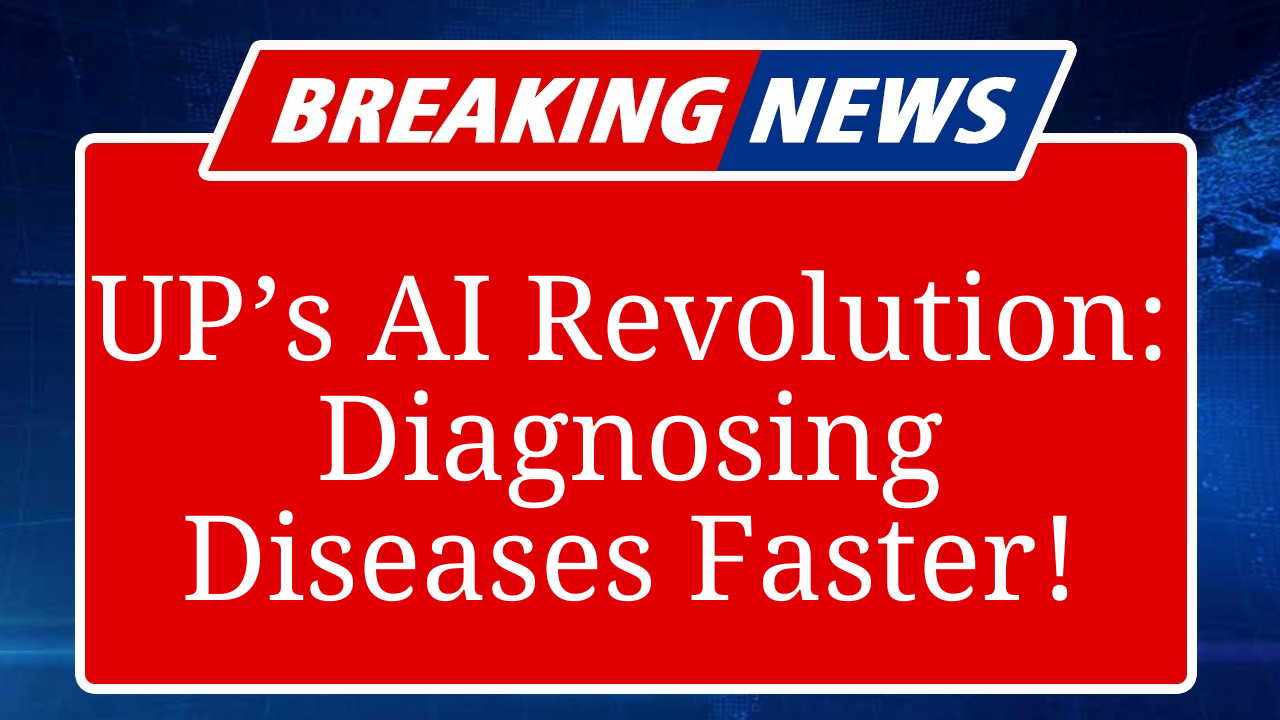“Uttar Pradesh is emerging as a hub for AI-driven health tech, with startups and government initiatives leveraging artificial intelligence to enhance diagnostics. From early disease detection to affordable healthcare solutions, UP’s innovations are transforming patient care. Despite challenges like data privacy and infrastructure, the state’s advancements promise a healthier future.”
UP’s AI Diagnostic Tools Lead India’s Health Tech Transformation
Uttar Pradesh (UP) is carving a niche in India’s burgeoning health tech landscape, with artificial intelligence (AI) at the forefront of diagnostic innovation. The state’s healthcare sector is witnessing a surge in AI-driven tools aimed at improving diagnostic accuracy, reducing costs, and enhancing accessibility, particularly in underserved rural areas.
In recent years, UP has seen a rise in startups and collaborations focused on AI-powered diagnostics. Companies like Noida-based HealthMitra AI, which raised ₹3 crore in a pre-seed funding round in February 2025, are developing autonomous AI solutions to bridge gaps in patient care. These tools analyze medical images such as X-rays and MRIs with precision, detecting conditions like tuberculosis and cardiovascular diseases early, often surpassing human accuracy. For instance, AI models trained on vast datasets can identify subtle patterns in chest X-rays, enabling early detection of lung cancer, a critical advantage in a state where late diagnoses are common due to limited specialist availability.
The UP government is also playing a pivotal role. Under the Ayushman Bharat program, a pilot initiative launched in 2024 uses AI to diagnose tuberculosis, diabetic retinopathy, and cervical cancer in select districts like Lucknow and Kanpur. This program, supported by the National Health Authority, aims to assess AI’s efficacy and cost-effectiveness, with plans to scale up if successful. The state’s investment in digital infrastructure, including the National Digital Health Mission, is facilitating the integration of AI tools into public healthcare systems, enabling real-time data analysis and remote consultations.
Academic institutions in UP are contributing significantly. The Indian Institute of Technology (IIT) Kanpur has partnered with local hospitals to develop AI algorithms for predictive diagnostics, focusing on diseases like diabetes, which affects over 10% of UP’s population. These algorithms analyze patient data, including medical history and genetic markers, to predict disease risks and recommend preventive measures. Similarly, King George’s Medical University in Lucknow is collaborating with tech firms to create AI-based tools for early detection of neurological disorders, leveraging machine learning to analyze brain scans.
However, challenges persist. UP’s healthcare sector faces issues like fragmented diagnostic labs, with over 10,000 operating across the state, many lacking standardized protocols. Data privacy concerns are significant, as AI tools rely on sensitive patient information. Compliance with data protection laws, such as India’s Digital Personal Data Protection Act, is critical to maintain trust. Additionally, rural areas in UP often lack the digital infrastructure needed for seamless AI integration, and there is a shortage of trained professionals to operate these systems.
Despite these hurdles, UP’s health tech ecosystem is thriving. Startups like Qure.ai, with operations in Noida, are developing AI-powered imaging solutions to address the shortage of radiologists. These tools reduce diagnostic turnaround times, crucial in a state with a doctor-to-patient ratio of 1:1,700, far below the WHO’s recommended 1:1,000. Moreover, AI-driven telemedicine platforms are gaining traction, enabling remote consultations in districts like Varanasi and Gorakhpur, where access to specialists is limited.
The economic impact is notable. A 2025 report estimates that AI in healthcare could contribute ₹200-250 billion to India’s GDP by 2026, with UP poised to be a significant contributor due to its large population and growing tech hub status. Investments in AI health tech in UP surged by 30% in 2024, driven by both private players and government backing. Collaborations with global tech giants like Microsoft and Google are further accelerating innovation, with pilot projects testing AI-driven disease surveillance systems in cities like Agra.
UP’s focus on AI diagnostics is also aligning with national goals. The National AI Portal, launched by the government, encourages collaboration between startups, researchers, and healthcare providers, fostering innovation. Initiatives like the “AI for Indian Healthcare” challenge, proposed by NITI Aayog, aim to develop tailored solutions for UP’s unique challenges, such as high rates of communicable diseases and limited healthcare access in rural areas.
The state’s efforts are not without global recognition. In March 2025, Bill Gates praised India’s advancements in AI-powered diagnostics, specifically highlighting UP’s role in developing low-cost TB tests that could benefit global health. As UP continues to invest in AI infrastructure and skilled talent, it is positioning itself as a leader in India’s health tech revolution, promising a future where quality healthcare is more accessible and equitable for its 230 million residents.
Disclaimer: This article is based on recent news, reports, and publicly available data from sources like India AI, Business Today, and government health initiatives. Information is accurate as of September 2, 2025, and reflects ongoing developments in UP’s health tech sector. Readers are advised to verify details with official sources for the latest updates.

